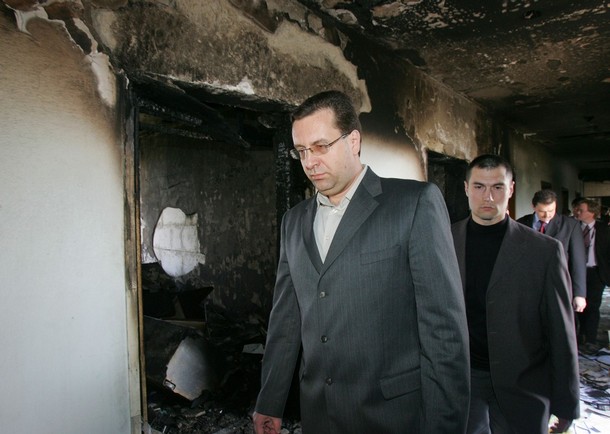
Newly Formed Moldovan Democratic Party Fills Vacuum in Political Landscape
Publication: Eurasia Daily Monitor Volume: 6 Issue: 129
By:

Along with the crisis and lame-duck situation of state institutions, Moldova’s multi-party system has also revealed its deficient substance. The Communist Party, anachronistic as such, has proven far stronger than all the other parties in terms of mass appeal and internal discipline. The party is highly centralized and being run from the office of President Voronin, who acts concurrently as executive head of state and party leader, contravening the constitution’s letter and spirit. The party’s communist label has very little in common with the actual content, however.
The self-described right-wing liberal parties have even less in common with liberalism. The Liberal Party is a Romanian national-irredentist party; the Liberal-Democrat Party is a tycoon-led initiative, with resources to recruit civil-society experts; and Our Moldova (applicant to join the Liberal International), is a final effort by second-echelon nomenklatura veterans to regain political office from those who did keep the Communist label for themselves.
While claiming to be better Europeans than the Communist Party, the three opposition parties rejected the European observation mission’s assessment of the April 5 elections, ignored E.U. officials’ persistent advice to avoid the repeat elections, and unceremoniously sent the E.U.’s High Representative Javier Solana back to Brussels from Chisinau empty-handed. The three opposition parties also rejected the Moldovan constitutional court’s validation of the election results. Defiance of a constitutional court verdict had been inconceivable in Moldova until now.
The missing link in this political landscape is a European-minded centrist or left-of-center party under credible leadership, transcending the antagonism between extremes and providing an element of balance to the political system. Such a party has emerged when Marian Lupu, chairman of the 2005-2009 parliament, quit the Communist Party in June and took over the small Democratic Party of Moldova. The hastily revamped party managed at the last moment to register its list of candidates for the campaign (Moldpres, Basapres, July 1, 6).
This party demarcates itself from the Communist Party and the multiple liberal parties in ways that offer a distinct political choice to voters. The Democratic Party proposes to rise above the fray and reintroduce basic civility to Moldova’s political process. It is not linked with big-business or other specific group interests. This party’s top candidates form the most distinguished team in terms of education, professional experience, polyglot abilities and international exposure. The team is unambiguously Western-orientated, focused on the European Union, and U.S.-friendly, though free from illusions about seeking NATO membership for Moldova. The party can still capitalize on Lupu’s high profile recognition in the country as chairman of the parliament until a few months ago. That post is the second-highest in the land and Lupu’s public profile is still second only to President Voronin’s.
On the issue of national identity the party’s leadership team is neither Moldovan-fundamentalist as most communists, nor Romanian-fundamentalist as many of the liberals are. Rather, it professes a distinct Moldovan political identity, which harmonizes with a Romanian cultural identity. The party leaders aspire to re-dignify the Moldovan identity after its relegation to inferior social status under Russian and Soviet rule, non-recognition of a Moldovan identity by Romania, repudiation of the Moldovan identity by part of the local intelligentsia, and the discrediting of Moldovan identity by poorly educated, partially Russified communists.
The Democratic Party faces daunting material hurdles, however. Its initial electoral base was 3 percent in April, two months before Lupu took over. The renewed party started late in the repeat elections with meager financing, few and weak territorial organizations, practically no access to administrative resources, and no media of its own (unlike the three opposition parties, all of whom have some media organizations behind them). These handicaps cannot be corrected in any significant way during a campaign limited to four weeks. The party can realistically hope to enter the new parliament by clearing the 5 percent threshold and perhaps garner two percentage points above that threshold.
That result depends, however, on demonstrating that this party truly differs from the other parties in style and substance. As Lupu recognized from the outset, a statesmanlike campaign style can attract many uncommitted voters to the Democratic Party when the other significant parties demonize each other. This party’s chance resides in highlighting that contrast, avoiding personal attacks and invective, and rising above the fray – a posture characteristic of Lupu during his chairmanship of the parliament.
On substance, the Democratic Party proposes to stake out the left-of-center zone on the political spectrum. That zone remains vacant after the Communist Party’s 2007-08 reversal of promises to reform itself into a European-type, Socialist or Social-Democrat party. Consequently, several Russia-oriented small parties are targeting the left-of-center groups of voters in Moldova. The Democratic Party can potentially fill that niche.
As a small party, the Democratic Party can realistically hope to hold the balance of power in the new parliament between the communists and the opposition bloc. It will in that case, position itself to negotiate with both camps and possibly arbitrate between the two. Consequently, the Democratic Party cannot afford during the electoral campaign to rule out post-election negotiations with either side. Democratic Party leaders are nevertheless being challenged to rule out negotiations with either side in advance, presumably as a demonstration of political virginity. By giving up its negotiating options in either direction, however, the party would risk marginalization through loss of bargaining leeway. In that case, Moldova’s political system would lose a much-needed stabilizing factor during the post-election period.




